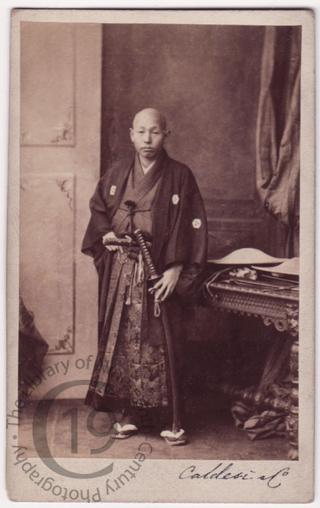
Dr Kawasaki
According to a report in the French newspaper Le Siècle, translated and repeated in The Times on Monday 28 April 1862: ‘The Japanese ambassadors will not leave for London until Wednesday. A French vessel will be placed at their disposal at Calais, to convey them to Dover… The Embassy will only remain for 12 days in England, and then proceed to Holland, where they are to remain until the end of May. They will afterwards spend 10 days in Berlin, and about the same at St Petersburg. Portugal will only receive the ambassadors after they have again been to Paris, where they propose to remain for another fortnight. A French vessel will afterwards convey the whole of the Legation to Japan via Suez.’
The mission consisted 'of 36 persons in all – namely, the three Ambassadors, a Vice-Governor, a confidential adviser, 18 officers, and 14 servants… The principal minister is a man of 52, and the two others are some 20 years younger’ [The Times, 3 May 1862].
While they were in London, the ambassadors stayed at Claridge’s hotel on Brook Street, and visited the Houses of Parliament (which ‘amazed and delighted them’ with its magnificence), the Zoological Gardens (where they displayed ‘extraordinary interest and pleasure’), and the opening of the International Exhibition. They also visited the Arsenal at Woolwich, the Mint, the Bank of England, the Tower of London, the London Docks, Greenwich, the Thames Tunnel, Hampton Court, Kew Gardens and the Crystal Palace. In addition, they attended many lunches, dinners and assemblies, and they even found time to travel as far afield as Newcastle, in order to see a coal mine in full operation, and Liverpool, where they were entertained at a banquet by the Mayor and corporation.
Photographed by Caldesi and Co.
Code: 122207




